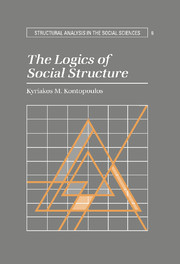Book contents
- Frontmatter
- Contents
- Preface
- Introduction
- Part I Metatheoretical considerations
- Part II Compositionist logics
- 5 Methodological individualism
- 6 Constructionism/compositionism: elementary notions
- 7 Complex systems of interaction
- Part III Logics of hierarchy
- Part IV Heteracrchical logics
- Part V The phenomenology of social structures
- Appendix: The logics of structuration
- Glossary
- Bibliography
- Index
6 - Constructionism/compositionism: elementary notions
Published online by Cambridge University Press: 24 October 2009
- Frontmatter
- Contents
- Preface
- Introduction
- Part I Metatheoretical considerations
- Part II Compositionist logics
- 5 Methodological individualism
- 6 Constructionism/compositionism: elementary notions
- 7 Complex systems of interaction
- Part III Logics of hierarchy
- Part IV Heteracrchical logics
- Part V The phenomenology of social structures
- Appendix: The logics of structuration
- Glossary
- Bibliography
- Index
Summary
The limitations of methodological individualism have not deterred many analysts from searching for an individualistic framework for the explanation of social phenomena which, if cautious enough, would avoid the pitfalls we have cited in the previous chapter. For example, a number of contemporary students of symbolic interactionism, phenomenology, and ethnomethodology have argued that their approaches are not variants of MI but instead examples of “methodological situationism” or “methodological relationism” (cf. J. O. Wilson 1987), or something of that sort. Examined analytically, these arguments do not seem to get us away from the field of individualistic micro-interactions since they fail to provide any operative mechanism of upward structuration. On the other hand, it is rather surprising that some of the most notable proponents of microstructural programs that have the potentials as well as some initial empirical support for moving beyond MI (e.g., game theory: Boudon, Elster, Hechter, among others), still conceive their approaches as being versions of strong, nearly orthodox methodological individualism. For it is clear that, as soon as one abandons the radical, reductive tendencies of MI, the scenery changes considerably as a result of the new assumptions and parameters introduced into the explanatory model. One then moves to the domain of compositionist or constructionist logics and is expected to investigate precisely these special constraints and emergent mechanisms. To these logics we turn now our attention.
- Type
- Chapter
- Information
- The Logics of Social Structure , pp. 102 - 125Publisher: Cambridge University PressPrint publication year: 1993

